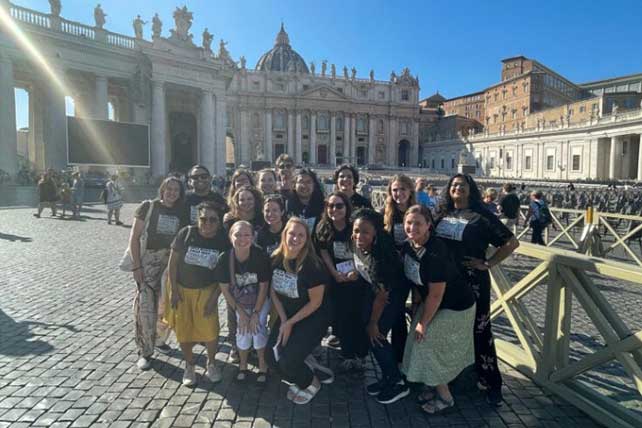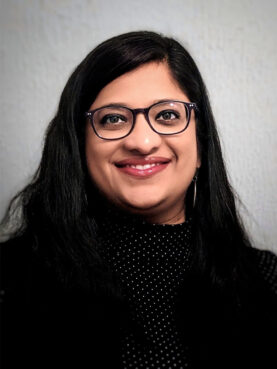Since SCHEAP’s representative Osęka and other global lay and ordained delegates have returned from the monthlong meeting, local and diocesan organizers are looking to continue the work, preparing for the synod’s next meeting, in October of 2024. The synod’s documents hold out a “preferential option for the youth,” noted Beth Ford McNamee, associate director in St. Joseph’s Office of Campus Ministry who coordinated synodal listening sessions with young adults in 2022 and 2023. “So we’re envisioning more students being trained as facilitators, and students gathering and listening sessions, continuing our work of discernment.”
RELATED: 5 Things The Catholic Church’s Document on Same-Sex Blessings Does (And Doesn’t) Say
SCHEAP plans to devote this year’s meetings to conversation, prayer and collective discernment, with Osęka and other student leaders playing an active role. Osęka will bring the resulting ideas back to the October 2024 synod gathering in Rome, where she will once again have a voting role.
JoAnn Melina Lopez, an alumna of St. Joseph’s who is now a lay minister in the Diocese of Toronto, was a facilitator at SCHEAP listening sessions, then attended a young adult pre-synod pilgrimage in Rome this summer. The weeklong pilgrimage had the purpose of praying for delegates and joining opening events. By the time the synod opened, she said, she was filled with hope for the process.
“In Rome, we felt this sense of coming together as one body, even across our differences, and that our call is to pray together, but also to really listen deeply and trust that the Holy Spirit is at work among us,” she said.
JoAnn Melina Lopez. (Photo via LinkedIn)
That body included more than just Catholics. On the eve of the synod’s first day, Pope Francis presided at an ecumenical Taize prayer vigil in St. Peter’s Square, where synod participants sat with members of Protestant and Eastern Orthodox churches as well as Eastern Rite churches in communion with Rome. “One of the quotes I heard during the pilgrimage,” Lopez said, “is that our discernment will never be fully complete as Catholics unless we’re listening to all the Christians of the world, because all of the baptized are part of the faithful.”
In his homily at the prayer service, Francis introduced the concept of silence as a synodal tool. “God does not like declarations and shouting, gossiping and noise,” the pope said. “Rather, he prefers to speak in the still, small voice,” referring to the silence of Christ’s Nativity and on the night of his Passion, and the examplars of Mary, Elijah and Abraham.
As a practical and spiritual matter, silence was built into the discussions at the synod. Each participant got a designated amount of time to speak, during which interruption was prohibited. This sent a message that all voices are valued, Lopez said.
That structure was designed to allow for empathetic and constructive dialogue amid divides in the church over some of the topics on the agenda, which included controversies such as welcoming LGBTQ Catholics and the role of women in the church, as well as the environment, immigration and global poverty.
“The process of the synodal conversation in the Spirit is egalitarian,” said Maureen O’Connell, professor of religion and theology at La Salle, “where everybody has an equal amount of time to speak without interruption and people are invited into moments of silence to receive what others have shared. We name what the conflicts and tensions are, not sidestep them.”
That sense of attentiveness to one’s neighbor, said Osęka, will drive her discernment as she looks forward to the next meeting of the synod. “I’ve leaned into my practice of the Ignatian spiritual approach of holy indifference,” she told RNS. “In the process of discernment, St. Ignatius calls us to make ourselves spiritually indifferent — not to prefer healthiness over sickness, not to prefer riches over poverty, and so on.
“That’s all that I pray for,” she added. “I think as young people, that if we rid ourselves of some presuppositions and biases when it comes to encountering another person, that opens up the space of surprise, that is a space of grace. That’s what synodality is about.”
This article originally appeared here.


